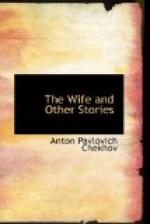Apparently, by the middle of the winter Dymov began to suspect that he was being deceived. As though his conscience was not clear, he could not look his wife straight in the face, did not smile with delight when he met her, and to avoid being left alone with her, he often brought in to dinner his colleague, Korostelev, a little close-cropped man with a wrinkled face, who kept buttoning and unbuttoning his reefer jacket with embarrassment when he talked with Olga Ivanovna, and then with his right hand nipped his left moustache. At dinner the two doctors talked about the fact that a displacement of the diaphragm was sometimes accompanied by irregularities of the heart, or that a great number of neurotic complaints were met with of late, or that Dymov had the day before found a cancer of the lower abdomen while dissecting a corpse with the diagnosis of pernicious anaemia. And it seemed as though they were talking of medicine to give Olga Ivanovna a chance of being silent—that is, of not lying. After dinner Korostelev sat down to the piano, while Dymov sighed and said to him:
“Ech, brother—well, well! Play something melancholy.”
Hunching up his shoulders and stretching his fingers wide apart, Korostelev played some chords and began singing in a tenor voice, “Show me the abode where the Russian peasant would not groan,” while Dymov sighed once more, propped his head on his fist, and sank into thought.
Olga Ivanovna had been extremely imprudent in her conduct of late. Every morning she woke up in a very bad humour and with the thought that she no longer cared for Ryabovsky, and that, thank God, it was all over now. But as she drank her coffee she reflected that Ryabovsky had robbed her of her husband, and that now she was left with neither her husband nor Ryabovsky; then she remembered talks she had heard among her acquaintances of a picture Ryabovsky was preparing for the exhibition, something striking, a mixture of genre and landscape, in the style of Polyenov, about which every one who had been into his studio went into raptures; and this, of course, she mused, he had created under her influence, and altogether, thanks to her influence, he had greatly changed for the better. Her influence was so beneficent and essential that if she were to leave him he might perhaps go to ruin. And she remembered, too, that the last time he had come to see her in a great-coat with flecks on it and a new tie, he had asked her languidly:
“Am I beautiful?”
And with his elegance, his long curls, and his blue eyes, he really was very beautiful (or perhaps it only seemed so), and he had been affectionate to her.
Considering and remembering many things Olga Ivanovna dressed and in great agitation drove to Ryabovsky’s studio. She found him in high spirits, and enchanted with his really magnificent picture. He was dancing about and playing the fool and answering serious questions with jokes. Olga Ivanovna was jealous of the picture and hated it, but from politeness she stood before the picture for five minutes in silence, and, heaving a sigh, as though before a holy shrine, said softly:




